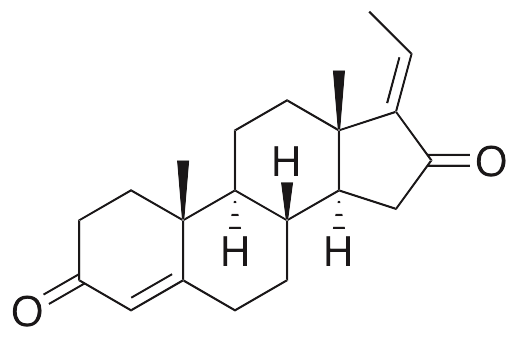Description
Guggulsterone is a plant steroid obtained from myrrh that exhibits a wide variety of beneficial properties, including anti-metastatic, anticancer, anti-angiogenic, anti-fibrotic, antioxidative, anti-inflammatory, and anti-hyperlipidemic activities. In vitro, guggulsterone increases activation of caspase 3, decreases expression of matrix metalloproteinase 9 (MMP9), cyclin D1, Bcl-2, xlAP, and mucin MUC4, inhibits FAK, Src, and JAK/STAT signaling, and disrupts cytoskeletal organization; together, this results in apoptosis and inhibition of growth and colony formation of pancreatic cancer cells. In colon cancer cells, this compound inhibits expression of VEGF, ARNT, and STAT3 and decreases activity of matrix metalloproteinases 2 and 9 (MMP2/9), inducing apoptosis. Guggulsterone also increases apoptosis in hepatic stellate cells through inhibition of NF-κB activation, suggesting potential benefit as a treatment for chronic liver disease. Guggulsterone also exhibits cardioprotective benefits, inhibiting doxorubicin-induced toxicity in cardiomyocytes; guggulsterone decreases activity of ROS, malondialdehyde, and caspase 3, and also reverses doxorubicin-induced changes in poly(ADP)-ribose polymerase (PARP) cleavage, caspase expression, Bcl-2/Bax ratio, and cytochrome c release. Additionally, guggulsterone increases heme oxygenase 1 (HO-1) expression and Nrf2 activity, potentially through modulation of phosphate and tensin homolog (PTEN), in vitro. In other cellular models, guggulsterone inhibits lipopolysaccharide-induced increases in COX-2 and TNF-α as well as decreases in IκB kinase-α. In cellular and animal models, guggulsterone inhibits preadipocyte differentiation and increases lipolysis of mature adipocytes. Guggulsterone also inhibits the farnesoid X receptor (FXR).
